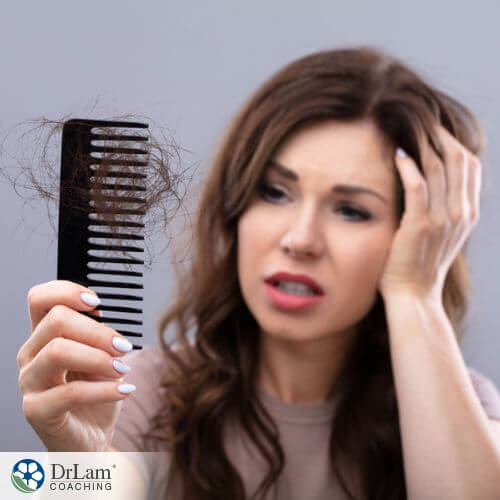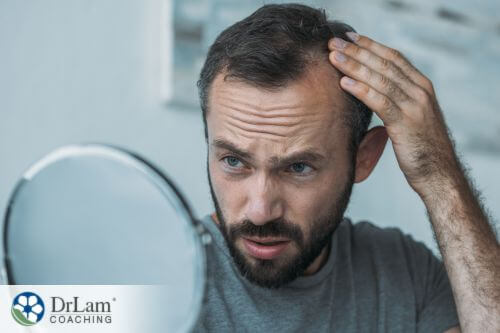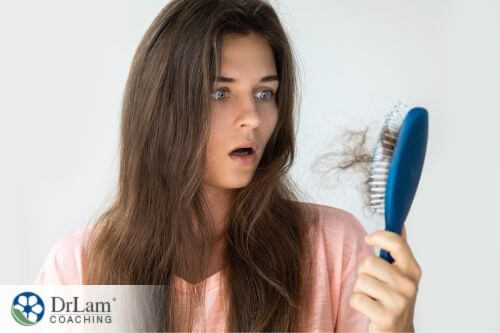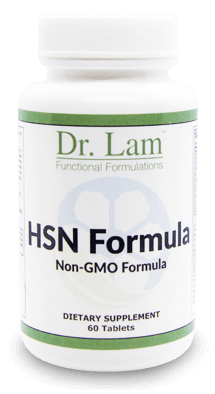 Hair loss, also referred to as alopecia, is a clinical condition that is widespread. It affects both women and men, and it can range from mild hair thinning to total baldness. There are several different reasons for hair falling out, from hormonal problems to genetic factors. Also, loss of hair can be either a temporary or permanent condition. Identifying the cause is essential to being able to provide appropriate remedies to alleviate the situation. As such, it’s critical that you see your dermatologist early to prevent it from worsening. In addition, there are some lifestyle and nutritional strategies that might help.
Hair loss, also referred to as alopecia, is a clinical condition that is widespread. It affects both women and men, and it can range from mild hair thinning to total baldness. There are several different reasons for hair falling out, from hormonal problems to genetic factors. Also, loss of hair can be either a temporary or permanent condition. Identifying the cause is essential to being able to provide appropriate remedies to alleviate the situation. As such, it’s critical that you see your dermatologist early to prevent it from worsening. In addition, there are some lifestyle and nutritional strategies that might help.
While hair loss can be hereditary, it can also result from hormonal changes, medical problems, or be a normal part of aging. Anyone can lose hair on their head. However, it's more common in men. The most common type of hair loss is androgenetic alopecia. According to an article in the Journal of Preventive Medicine and Hygiene, androgenetic alopecia affects 80% of men and 50% of women.
Furthermore, on a global level, half of men experience hair loss by the time they are 50 years old. Also, before the age of 21, 25% of men who will later become bald see the first signs of hair loss.
The most significant reason for hair loss in women is female-pattern hair loss (FPHL). It affects roughly one-third of vulnerable women, which is some 30 million women in the United States.
A combination of genetic factors and a production of male sex hormones, or androgens, is the major culprit of balding among men. The hormone DHT -- a byproduct of testosterone and an androgenic steroid, is primarily responsible for male pattern baldness. Specifically, DHT can affect the hair follicles, targeting them and causing them to shrink. As time progresses, these hair follicles may not grow any new hairs.
The main signs and symptoms of alopecia include the following:
These are all signs that you are losing too much hair.
There are several causes of hair loss, and many can be treated successfully. However, getting to the root of the problem must be the starting point to achieve this. If you figure out what’s causing it, you can understand the behavior to expect from your hair. Specifically, you can determine if your hair falls out slowly or suddenly thins, will regrow without or without treatment, or needs immediate care to stop permanent hair loss.
Here’s a glance at some reasons people suffer from hair loss.
Hereditary hair loss can affect both men and women, and it’s the main cause of people losing their hair. The medical term for hereditary hair loss is androgenic alopecia. It means that inherited genes that result in shrinking hair follicles and hair that eventually stops growing.
Some people may notice their hair shrinking as early as in their teens, but typically, it begins later in life. Furthermore, women can usually expect overall thinning or a widening part. Men can usually expect to notice a receding hairline or bald spot at the top of the head.
 As age progresses, you may notice some hair loss, since hair growth slows the older you get. Eventually, your hair follicles stop growing hair, and this causes the hair on your scalp to thin. Also, you may notice that your hair begins to lose its color. Usually, in women, the hairline naturally begins to recede.
As age progresses, you may notice some hair loss, since hair growth slows the older you get. Eventually, your hair follicles stop growing hair, and this causes the hair on your scalp to thin. Also, you may notice that your hair begins to lose its color. Usually, in women, the hairline naturally begins to recede.
Alopecia areata is a condition that develops when your immune system attacks hair follicles and results in hair loss. With this condition, you can lose hair from any area of your body, such as your scalp, inside your ears and nose, and eyebrows or eyelashes.
Chemotherapy or radiation therapy to your head or neck for cancer could cause you to lose your hair. Some people lose most, if not all, of their hair within a few weeks of beginning treatment.
Some women may notice hair loss a few months after delivering their baby. Also, you may lose hair after recovering from an illness or experiencing an operation. Furthermore, significant emotional stress or stressors in your life can also be factors. The stress of dealing with a divorce or death can be the cause of a lot more hairs in your brush.
Your hair care routine could be the reason your hair is falling out. If you color, perm, or relax your hair, these have the potential to damage your hair over time. Also, certain hairstyles, like an up-do, braids, or cornrows, can pull on your scalp. Sometimes, the hairstyle may pull your hair too tightly and if this continues, permanent loss of hair or traction alopecia could result.
In women with hormonal imbalance, polycystic ovary syndrome (PCOS) is sometimes the cause. This condition causes cysts to develop on a woman’s ovaries, and can cause symptoms like hair loss. Additionally, taking a break from particular birth control pills can also result in a temporary hormonal imbalance. This, too, can cause the hair to thin or fall out.
Some of the other causes may include:
There are three different types: female pattern hair loss (FPHL), anagen effluvium, and telogen effluvium.
There are three cycles that hair goes through:
 One of the long-term side effects of COVID-19 infection that has been reported is hair loss. This is among the list of common symptoms, including brain fog, loss of taste and smell, and fatigue. People who experience hair loss resulting from SARS-CoV-2 infection may observe clumps of hair falling out with daily combings, or when washing their hair. Scientists refer to the phenomenon as telogen effluvium, or hair loss due to a stressor.
One of the long-term side effects of COVID-19 infection that has been reported is hair loss. This is among the list of common symptoms, including brain fog, loss of taste and smell, and fatigue. People who experience hair loss resulting from SARS-CoV-2 infection may observe clumps of hair falling out with daily combings, or when washing their hair. Scientists refer to the phenomenon as telogen effluvium, or hair loss due to a stressor.
With COVID-19 infection, some patients experience a premature shift of a large amount of growing anagen hairs into a resting telogen state. As such, the normal 10% of hairs in the resting and shedding phase could jump to 50% instead. Some people experience shedding two to three months after COVID-19 infection.
The good news is that telogen effluvium does not destroy hair follicles. This means that, while your hair may not temporarily grow, your hair will eventually grow back because the follicles are still intact.
There are a few steps that you can take to limit losing your hair from your scalp. These include:
Stress can play a role in hair shedding and other conditions like adrenal fatigue. Your body’s first line of defense against stress is the adrenal glands, which produce the anti-stress hormone, cortisol. This is part of the NeuroEndoMetabolic (NEM) stress response, a system of related organs your body uses to manage stressors. The adrenals are part of the Hormone Circuit, along with the thyroid gland and reproductive organs.
The body can handle short-term stress, but chronic stress can lead to problems like hair loss and deplete the adrenals. Adrenal Fatigue Syndrome (AFS) is the non-Addison's form of adrenal dysfunction, where the body's stress response cannot keep up with life's chronic stressors.
In the beginning stages of AFS, your body’s cortisol level is high. However, as stress continues, the adrenal glands typically become exhausted and cortisol output decreases. The symptoms of adrenal fatigue include fatigue, weight gain, insomnia, hair loss, brittle hair, brittle nails, dry skin, itchy skin, brain fog, and an inability to handle stress.
One of the biggest stressors that you may experience is an unhealthy diet. Nutrition plays a key function in the dysregulation of the adrenal glands and the Hormone Circuit. Nutrition is also a crucial factor for healthy hair, since certain foods you eat can strengthen and grow your hair.
 Nutritional supplements are often used for remedying hair loss. A recent review published in the journal JAMA Dermatology combines research data on nutritional supplements that could treat it. Their findings reveal that supplements like pumpkin seed oil, zinc, vitamin E, omega fatty acids, and certain commercial formulations like Viviscal and Nutrafol showed promise in alleviating specific types of hair loss.
Nutritional supplements are often used for remedying hair loss. A recent review published in the journal JAMA Dermatology combines research data on nutritional supplements that could treat it. Their findings reveal that supplements like pumpkin seed oil, zinc, vitamin E, omega fatty acids, and certain commercial formulations like Viviscal and Nutrafol showed promise in alleviating specific types of hair loss.
Several vitamins can help to stimulate hair growth. The best options are as follows:
A healthy diet helps your hair. It should consist of lots of organic vegetables, lean proteins, healthy fats, and whole grains. These help ensure that your body has all the vitamins and minerals it needs. Avoid a poor diet of mostly processed foods that are high in sugar and salts and lack important nutrients. This type of diet can affect cell growth and cause hair loss. Aim to include in your diet good levels of vitamin C, B vitamins, iron, and essential fatty acids, like omega-3s.
You can stimulate your hair growth by adding certain superfoods to your diet. These include:
These foods contribute to a healthy diet and may help prevent some types of this issue.
Hair loss affects both men and women and can impact your quality of life. Genetics and aging are the most common causes of a person losing their hair. If you are losing your hair and want answers, visit your doctor to know why your hair is falling out and what can be done. However, taking steps like eating a healthy diet and avoiding certain styling choices may also help.
If you would like to learn about natural ways to regrow your hair, the team at Dr. Lam Coaching can help. We offer a free** no-obligation phone consultation at +1 (626) 571-1234 where we will privately discuss your health concerns and various options. You can also send us a question through our Ask The Doctor system by clicking here.

Rediscover fuller hair with HSN Formula today!
Drake, Lara, et al. “Evaluation of the Safety and Effectiveness of Nutritional Supplements for Treating Hair Loss: A Systematic Review.” JAMA Dermatology vol. 159,1 (2023): 79-86. https://pubmed.ncbi.nlm.nih.gov/36449274/
Gokce, Nuriye, et al. “An overview of the genetic aspects of hair loss and its connection with nutrition.” Journal of preventive medicine and hygiene vol. 63,2 Suppl 3 E228-E238. 17 Oct. 2022, https://pubmed.ncbi.nlm.nih.gov/36479473/
Shapiro, J et al. “Practical management of hair loss.” Canadian family physician Medecin de famille canadien vol. 46 (2000): 1469-77. https://www.ncbi.nlm.nih.gov/pmc/articles/PMC2144852/
Some of the causes of hair loss are genetics, hormone imbalance, infection, disease, age, cancer treatment, STD, as well as hair care and hair style. You can prevent hair loss by eating a nutrient rich diet, taking certain vitamins, practicing proper hair care and hair style techniques, limiting stress, and treating your hair gently.